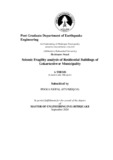Please use this identifier to cite or link to this item:
https://elibrary.khec.edu.np/handle/123456789/503Full metadata record
| DC Field | Value | Language |
|---|---|---|
| dc.contributor.advisor | Er. SWOPNIL OJHA; Dr. MANJIP SHAKYA | - |
| dc.contributor.author | NEPAL, POOJA | - |
| dc.date.accessioned | 2023-06-08T09:40:45Z | - |
| dc.date.available | 2023-06-08T09:40:45Z | - |
| dc.date.issued | 2020-09 | - |
| dc.identifier.uri | https://elibrary.khec.edu.np/handle/123456789/503 | - |
| dc.description.abstract | Nepal is a developing country that is prone to earthquakes and one of the most vulnerable countries that requires earthquake preparedness . The destruction of buildings during various earthquakes emphasizes the importance of fragility curves and their evaluation in the coming days. For estimating potential losses on existing building stock, the HAZUS methodology has been widely used, particularly in urban areas. This research incoperates probability of exceeding damages subjecting to seismic excitation using fragility assessment method. A case study was performed in RC residential building located in gokarneshwor municipality ,Kathmandu . Pushover analysis and non-linear time history analysis were used to evaluate demand and building capacity for the seismic analysis. Fragility curves were developed following Hazus methodology for the four limit states slight damage, moderate damage, extensive damage and collapse to obtained the probability of failure damage due to various levels of strong ground motions. | en_US |
| dc.language.iso | en | en_US |
| dc.title | Seismic Fragility analysis of Residential Buildings of Gokarneshwor Municipality | en_US |
| dc.type | Thesis | en_US |
| local.college.name | Khwopa Engineering College | - |
| local.degree.name | ME Earthquake | - |
| local.degree.level | Masters | - |
| Appears in Collections: | Master of Science (M.Sc) in Earthquake engineering | |
Files in This Item:
| File | Description | Size | Format | |
|---|---|---|---|---|
| Pooja_Nepal_2018.pdf Restricted Access | 2.88 MB | Adobe PDF |  View/Open Request a copy |
Items in DSpace are protected by copyright, with all rights reserved, unless otherwise indicated.
